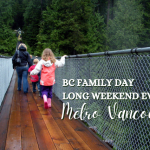Mason Bees in Stanley Park
This post has been contributed by Kathleen Stormont, SPES Communications Specialist with the Stanley Park Ecology Society (“SPES”).
The Buzz about Mason Bees
Hives, honey and yellow stripes likely come to mind when you think of bees. We’re all familiar with the iconic honeybee, but there are over 4,000 native bee species in North America and many sport colours ranging from red to metallic green. Unlike the social, domesticated honeybees, these wild bees are solitary – living in hollow stems and soil burrows, or under rocks and leaves.

A native orchard mason bee pollinates
an apple blossom. Photo: Red58bill, Wikimedia.org
Stanley Park Ecology Society (SPES) is working to support one of these solitary bee species, the blue orchard mason bee.
Like many bees around the world, our mason bees (Osmia lignaria) are in trouble, threatened by severe habitat loss, escalating pesticide use, and pollen mites. Without the bees’ pollination services, many wild plants and cultivated crops would be unable to thrive. Although SPES is hosting only a small number of mason bees (about 300), the benefits may be significant: 6 mason bees will pollinate one fruit tree compared to 10,000 honey bees! In Stanley Park, the bees work hard to pollinate early spring flowers like our native salmonberries. A single mason bee will visit between 1,600 to 2,400 blossoms daily, and pollinate over 90% of them.
You’ll find evidence of our mason bee program just north of the Nature House on Lost Lagoon in Stanley Park. In a sunny patch beside the lake, look for bee habitat complete with native flowering plants and bee “condos”.

SPES Conservation Technician Ariane Comeau
manages the bee condo at Lost Lagoon.
Plastic blocks of tubes house the bees over the winter. Come spring, the male bees are the first to hatch from their cocoons in the tubes, waiting for the females to emerge so they can pounce and mate. The females feed on nectar to build their strength for laying up to 30 eggs each in an empty tube.
By June all the eggs are laid and the adult bees die. Bee larvae emerge from the eggs a week after being laid. They feed for a month on the pollen mass left in the tube by their mother, then spin a cocoon around themselves and slowly transform into an adult bee over fall and winter. The warmth of next spring spurs them to emerge from their cocoons and start the cycle of life again.

An orchard mason bee rests on its “condo”.
Photo by Michael Schmidt.
We chose plants for our bee garden that bloom when the bees are emerging from their cocoons. This ensures a stable food supply for the busy bees.
You can plant the same native species on your balcony or in your yard to support these and other pollinators.
Some good plant choices include: coastal strawberry, nodding onion, red flowering currant, Nootka rose, and tall Oregon grape.

Volunteers plant Oregon grape at the bee garden by Lost Lagoon.
Photo by Michael Schmidt.
Keeping mason bees in your own garden, or even on your condo balcony, is an easy way to promote pollination and support this important pollinator.
Learn more about mason bees and their care online here »
Special thanks to the Al Roadburg Foundation for supporting the Stanley Park mason bees project
About SPES Saturday
 As a member of the Stanley Park Ecology Society (“SPES”), I wanted to offer the organization an opportunity to share their news, events, and work so I created the “SPES Series” years ago. This is where SPES can contribute and share stories with my audience once a month. Follow SPES on Facebook for more information.
As a member of the Stanley Park Ecology Society (“SPES”), I wanted to offer the organization an opportunity to share their news, events, and work so I created the “SPES Series” years ago. This is where SPES can contribute and share stories with my audience once a month. Follow SPES on Facebook for more information.










